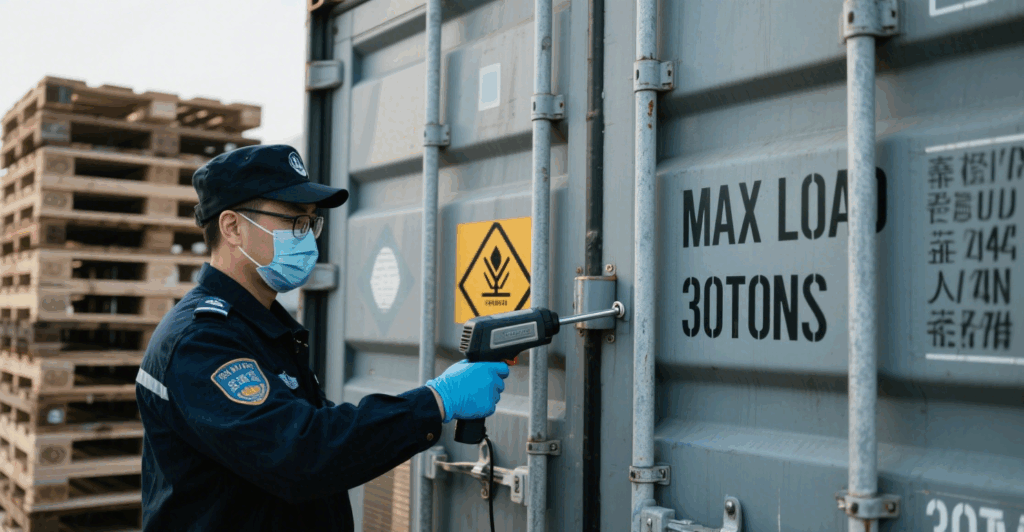If you’re in logistics, you might ask, what is FOB mean? “FOB” (Free On Board) defines when responsibility for goods shifts from the seller to the buyer. This term impacts shipping costs, liability, and risk. Understanding FOB terms with TJ Top China Freight ensures smoother transactions.

1. What Is FOB?
“FOB” stands for Free On Board, a term used to specify when the ownership and responsibility for the goods are transferred from the seller to the buyer. It is typically part of the Incoterms® (International Commercial Terms) and outlines the obligations of both parties involved in the shipping process.

- FOB Origin means that the buyer assumes responsibility for the goods once they are loaded onto the shipping vessel at the seller’s location.
- FOB Destination means the seller retains responsibility until the goods reach the buyer’s destination.
2. Types of FOB
Understanding the different types of that is essential to determining who is responsible for various costs and risks:
2.1 Origin (Shipping Point)
- Buyer assumes responsibility for the goods once they are loaded onto the vessel.
- The buyer is responsible for the shipping costs, insurance, and any damage or loss that occurs during transportation.
- Risk transfers at the seller’s location.
2.2 Destination
- Seller retains responsibility until the goods reach the buyer’s destination port.
- The seller covers the shipping costs and handles the risk until the goods arrive at the destination port.
- Risk transfers when the goods are delivered to the buyer.
3. Why FOB Matters?
FOB determines key aspects like liability, shipping costs, and risk management.
3.1 Liability
- Origin: The buyer assumes liability once the goods are loaded.
- Destination: The seller retains liability until the goods arrive at the buyer’s location.
3.2 Shipping Costs
- Origin: The buyer pays for shipping from the seller’s location.
- Destination: The seller pays for shipping until the goods reach the destination.
3.3 Risk Management
- Risk is transferred at different points, depending on the type of FOB. Understanding when responsibility shifts helps in managing insurance needs.
4. How to Calculate Shipping Costs with FOB?
Shipping costs vary based on whether you’re dealing with FOB Origin or FOB Destination.
4.1 Origin
- The buyer is responsible for all transportation costs from the seller’s location.
- The buyer should get a rate quote for shipping from the seller to the final destination.
4.2 Destination
- The seller is responsible for the shipping costs and risks until the goods reach the buyer’s destination.
- The seller needs to estimate shipping costs and any associated charges.

5. FOB and Customs Duties
Customs duties are a separate consideration from FOB terms. Here’s how they apply:
5.1 Under Origin
- The buyer handles customs clearance and pays duties upon arrival at the destination port.
5.2 Under Destination
- The seller manages customs duties and documentation until delivery to the buyer.
6. Risk Management in FOB Shipping
FOB plays a significant role in risk management during international trade. Here’s how risk is managed under different FOB terms:
6.1 Origin
- Risk Transfers: The moment the goods are loaded onto the vessel at the seller’s location, the risk of damage or loss passes to the buyer.
- Insurance: The buyer must arrange for shipping insurance once the goods are on board.
6.2 Destination
- Risk Retained by Seller: The seller retains the risk of any loss or damage until the goods are delivered to the destination.
- Insurance: The seller is responsible for the insurance until the goods arrive at the buyer’s specified destination.
7. Best Practices When Choosing FOB Terms
Choosing the right term is crucial for protecting your business interests in international shipping. Consider these best practices when making a decision:
📍Understand Your Control Preferences
- Origin offers the buyer more control over the shipping process.
- Destination gives the seller control over the shipping, including managing risks during transit.
📍Evaluate Your Risk Tolerance
- If you are the buyer, be sure you have proper insurance in place under Origin.
- Sellers who prefer not to deal with the complexities of shipping and risk management may prefer Destination.
📍Compare Shipping Costs
- Origin may appear to offer lower upfront costs for buyers, but they are responsible for all costs after the goods are loaded onto the ship.
- Destination may lead to higher initial costs, but the seller absorbs shipping risks.
8.Conclusion
FOB is a crucial term in international shipping that defines when responsibility for goods transfers from the seller to the buyer. Understanding FOB Origin and FOB Destination helps both parties manage liability, shipping costs, and risk more effectively. Always clarify FOB terms in contracts to ensure smooth transactions, especially when working with reliable logistics providers like TJ Top China Freight.
Request a Quote
Need a tailored solution for your shipping from China?
Let TJ China Freight Forwarder assist you with reliable, cost-effective service.
FAQ:
Q1.What is the difference between Origin and Destination?
FOB Origin means the buyer assumes responsibility for the goods when they leave the seller’s location, while FOB Destination means the seller retains responsibility until the goods reach the buyer’s location.
Q2.Does the seller or the buyer pay for shipping in FOB?
It depends on the type of FOB. In FOB Origin, the buyer pays for the shipping, while in FOB Destination, the seller covers the shipping costs.
Q3.Can FOB terms be negotiated?
Yes, the FOB terms can be negotiated between the buyer and seller, including which party assumes responsibility for shipping costs and risk.
Q4. Why is FOB important in international shipping?
FOB helps clarify who is responsible for the goods, what costs will be incurred, and who assumes liability for any damages during transit, ensuring both parties are clear about their obligations.
Q5.Can FOB be used for all types of shipments?
Yes, FOB terms can be applied to any type of shipment, including ocean freight, air freight, and even land transportation, depending on the specific contract and nature of the goods.
